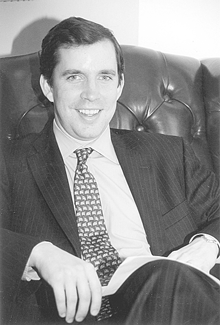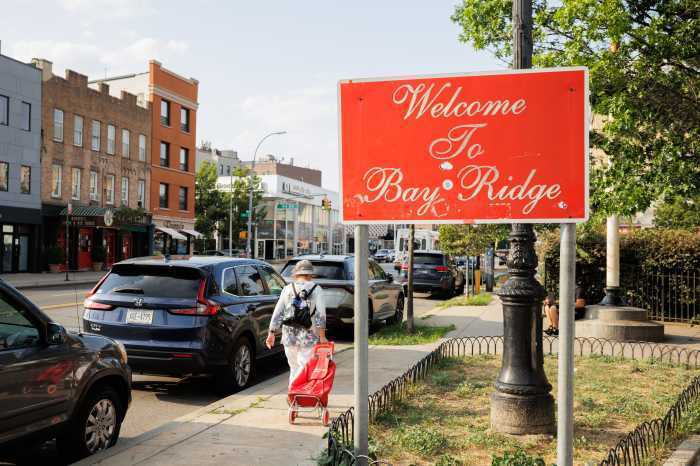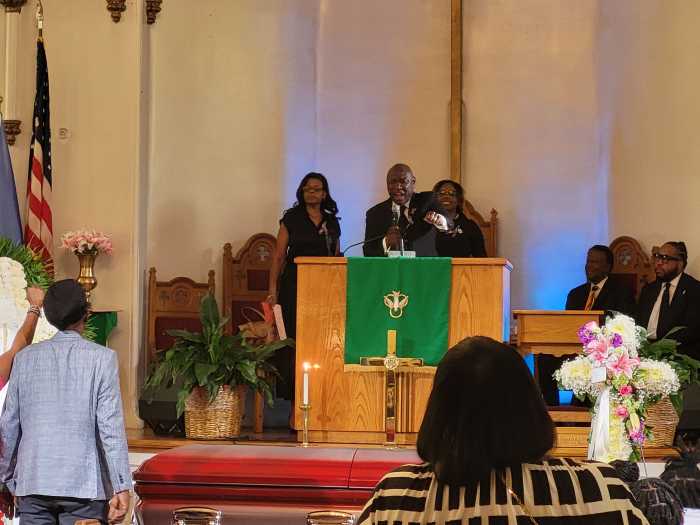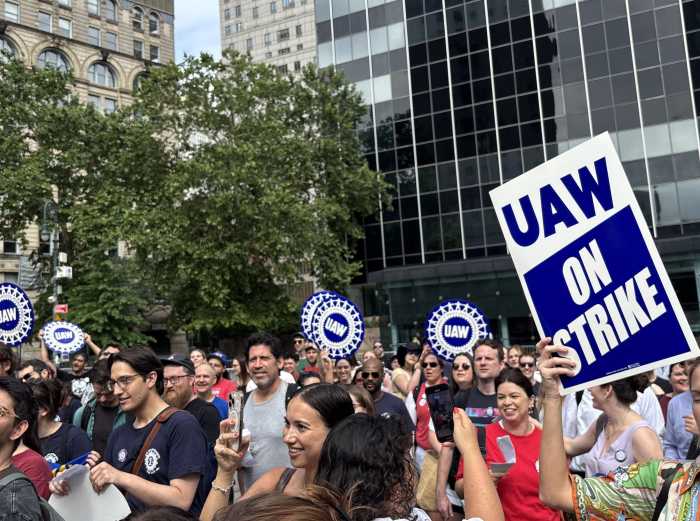Now officially a mayoral candidate, Council speaker blasts Bloomberg for being AWOL
Gifford Miller, the Democratic City Council speaker who formally announced his candidacy for mayor on February 4—the same day that Supreme Court Justice Doris Ling-Cohan issued her stunning gay marriage ruling—makes no bones about his impatience with the current mayor’s decision to appeal that ruling.
In an interview on February 25, Miller rejected Michael Bloomberg’s arguments by using imagery likely to strike a visceral chord among many gay and lesbian voters.
“Mayor Bloomberg thinks that gay people kissing each other near a government building is chaos,” the speaker said, referring to the mayor’s statement that he wants to avoid the upheaval faced by 4,000 couples in San Francisco last year who had their marriages overturned by the California Supreme Court. “That’s not chaos, it’s freedom.”
Miller has hammered Bloomberg about the city’s appeal of the marriage ruling since February 5, the day after Ling-Cohan’s decision, when the mayor appeared at the annual New York dinner of the Washington-based Human Rights Campaign to explain his decision. From the speaker’s perspective, Bloomberg’s stand on the marriage ruling is of a piece with his failure to be the leader on national urban issues that Miller says the New York City mayor should be.
“Bloomberg spent four years sitting out the central issue for the LGBT community,” Miller charged, noting that the mayor only articulated his support for same-sex marriage rights the day that he announced he was appealing the pro-marriage ruling. “That is unacceptable.”
On several occasions since the Ling-Cohan ruling, Miller has needled Bloomberg for having so long maintained that his personal view of gay marriage was irrelevant but now taking the position that gay voters should credit him for his personal support while ignoring the appeal he is mounting in court. The mayor has said that the marriage issue should ultimately be decided by the state Legislature and promised his support in lobbying leaders in Albany to act. Last week, the speaker argued, however, that the issue goes deeper simply than a difference between Bloomberg’s private views and his public actions as mayor.
“The arguments being made by the city’s attorneys make clear that the mayor believes that the equal protection clause does not apply to gay and lesbian people,” Miller said. “It’s not a matter of marriage being a nice goal—it is about equal rights. It shouldn’t be up to the Legislature.”
Miller has not been alone among city Democrats in speaking out against Bloomberg on the marriage ruling appeal. Four of the Democrats likely to appear on the mayoral primary ballot in September—former Bronx Borough Pres. Fernando Ferrer, Manhattan Borough Pres. C. Virginia Fields and Brooklyn Congressman Anthony Weiner, in addition to Miller—are on the record in support of same-sex marriage rights, and Ferrer and Fields, in particular, have echoed Miller’s critique of the mayor.
But all of them face a political quandary of sorts from the fact that state Attorney Gen. Eliot Spitzer, the odds-on favorite to become the Democratic candidate for governor next year, has defended the current marriage law in a number of lawsuits filed outside of New York City. Just one day before the Miller interview, Spitzer had confirmed to The New York Times that he plans to endorse Ferrer in the mayoral contest, opening up an opportunity for the speaker to score some political points at the attorney general’s and, by implication, Ferrer’s expense. Miller seemed reluctant to go there.
Asked how Spitzer’s position could be distinguished from Bloomberg’s, Miller responded, “That’s different. He has the legal obligation to defend the laws of the state. He is supposed to presume the constitutionality of a statute.” Reminded that former Attorney Gen. Robert Abrams declined to defend the constitutionality of New York’s sodomy law in the 1980s, Miller, paused, then said simply, “I would have preferred if Attorney Gen. Spitzer had stood up and said that gay men and lesbians have the constitutional right to marriage.”
The speaker acknowledged that even had Bloomberg not appealed the marriage ruling, it would one day have been reviewed by a higher court, but argued that Republican Gov. George Pataki would not have been able to enter the case during the 30-day stay that Ling-Cohan gave the city to decide on an appeal, since the city clerk and not the state was the defendant in the case. In the meanwhile, Miller said, same-sex marriages would have begun in the city and that fact would have strengthened the ruling’s force on appeal.
“The case would have been stronger because then judges would have to take away someone’s marriages,” he argued. “It’s just human nature.”
Miller said that during the mayoral campaign, he aims to demonstrate to the city’s queer community that lesbian, gay, bisexual and transgender issues “are incredibly important to me.”
Pointing to his leadership as speaker since early 2002, during which time the City Council has passed a gender rights measure, the Equal Benefits Law, which requires city contractors to offer their gay and lesbian employees domestic partner benefits on par with the spousal benefits they give, and the Dignity for All Schools Act (DASA), an anti-harassment measure that includes protections for LGBT public school students, Miller asserted, “I’ve accomplished more for the LGBT community than any city elected official in a long time.”
“I want to be present and accounted for,” he continued.
The contractor law and DASA were passed over Bloomberg’s veto, and the mayor is challenging the contractor law in court. DASA is scheduled to go into effect this month, but asked what steps Bloomberg’s education department has taken to meet that deadline, Miller said, “We’re not sure. They’re not ready. We won’t be surprised if they go to court.”
He went on to warn that if the administration does not comply with the law, “We’ll go to court.”
The speaker declined to offer an assessment on the performance of the city health department in its recent announcement that it may have uncovered a new drug-resistant, fast-progressing strain of HIV, saying, “I’m not a doctor,” but he faulted the current administration for failing to press harder on prevention issues. Miller noted that the mayor’s preliminary budget proposal zeroes out a million dollars the Council found last year to begin combating crystal meth addiction and reduced the current $8.7 million devoted to HIV prevention in communities of color to the $5 million permanent base level for that program.
The speaker also echoed sentiments voiced by AIDS housing advocates, who were caught off guard when Verna Eggleston, Bloomberg’s Human Resources Administration commissioner, appeared before the Council’s General Welfare Committee on February 18 and voiced support for three pieces of legislation aimed at addressing the long unmet needs of homeless New Yorkers living with HIV.
“It was a bit of a surprise that it came from a commissioner whose testimony before the Council has at times been erratic,” Miller said, referring to Eggleston, who is the former executive director of the Hetrick-Martin Institute, which provides educational, social and support serves to queer youth.
Asked if he took Eggleston’s vow of support at face value, the speaker responded, “We don’t look for fights. We expect their cooperation. Those bills are going to be passed.”
Miller spoke to Gay City News the morning after delivering his State of the City address, in which his principle themes were his claim that the mayor, despite having taken over direct administrative control of the public schools, was failing on education; his opposition to public spending to build a new stadium for the Jets on the West Side; and his assertion that Bloomberg had let the deficit between the amount that city residents pay in state and federal taxes and the funding New York receives in return grow from $20 billion to $24 billion.
“Ladies and gentleman, we are going backwards, by $4 billion,” Miller told his audience on February 24.
The speaker’s critique here harked back to what he said is Bloomberg’s failure to articulate an urban agenda for the U.S., something particularly needed at a time of Republican predominance in Washington. Miller specifically faulted the mayor on his inability to win adequate security funding from the federal government, going so far as to invoke former Mayor Rudy Giuliani’s name, saying he would have performed much better.
And Miller used his critique of the Bloomberg security record to recall the mayor’s role as host of last year’s GOP convention.
“When Michael Bloomberg appears at the Republican National Convention and thanks George W. Bush for security money, it is like John Kerry thanking the swift boat veterans,” Miller said.
gaycitynews.com



































